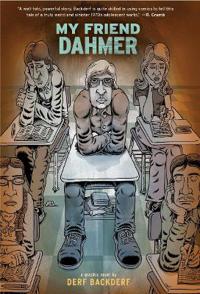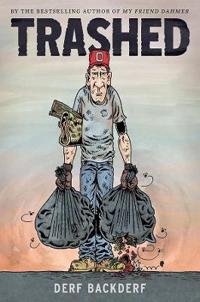
Derf Backderf (som egentligen heter John i förnamn) föddes 1959 och växte upp i en medelstor stad i Ohio. Det slumpade sig inte bättre än att han var klasskamrat med
Jeffrey Dahmer, som kort efter att deras vägar skildes åt i samband med high school-examen begick sitt första mord, och som 13 år senare skulle bli känd under beteckningen "the Milwaukee Cannibal" som en av USA:s värsta och mest bestialiska seriemördare, men 17 liv på sitt samvete. Dahmer dömdes till (mångdubbelt) livstids fängelse, och blev ihjälslagen av en medfånge 1994. Men
My Friend Dahmer utspelar sig (till allra största delen) innan Dahmer blev mördare. High school-skildringar har ofta ett mörkt stråk i sig (jag tänker här framför allt på flera böcker av Stephen King), men den här boken är nog den svartaste jag läst i genren, och möjligen överhuvudtaget. Den är skriven med vad jag uppfattar som total ärlighet, utsökt fingertoppskänsla och stor medkänsla med huvudpersonen; Backderf är dock noga med att poängtera att hans sympati med Dahmer helt och hållet tar slut när denne tar steget från
troubled teenager till kallblodig mördare. Vad som (utöver de mord man vet skall komma) är mest omskakande är vuxenvärldens enhälliga vägran att se de uppenbara tecknen på att Dahmer var i desperat behov av hjälp. Både lärare och föräldrar hävdar efteråt att de inte lade märke till att han avvek på något särskilt vis från den typiske lite stökige tonåringen.

Trashed är, liksom
My Friend Dahmer, övervägande självbiografiskt baserad, och behandlar det moderna konsumtionssamhällets bokstavliga baksida. Konkret får vi ta del av Backderfs korta karriär, 19 år gammal, som renhållningsarbetare; han har dock valt att förflytta handlingen från sent 1970-tal till något som mer liknar nutid, möjligen för att smidigare passa in aktuella fakta kring amerikansk sophantering. De unga sopgubbarnas självironiska jargong (som ibland för tankarna till Martin Kellermans
Rocky, fast bättre), och de många dråpliga händelserna (måhända inget för den äckelmagade) borgar för nöjsam läsning, men insikterna i modern (om uttrycket tillåts) sophantering gör boken upprörande och skrämmande. Till skillnad mot hos oss i Sverige - där vi för all del överkonsumerar med negativa konsekvenser för miljön, om än inte lika illa som i USA - domineras amerikansk sophantering ännu av dumpandet av osorterat avfall i enorma
landfills, med stora konsekvenser för miljön. För den som inte nöjer sig med exempelvis
global statistik över olika länders koldioxidutsläpp i vederläggandet av Vita husets
fullkomligt absurda uttalande i samband med det nyligen annonserade utträdet ur Parisavtalet, att
"the United States, under the Trump administration, will continue to be the cleanest and most environmentally friendly country on Earth", så kan
Trashed erbjuda en hel del kompletterande ammunition.